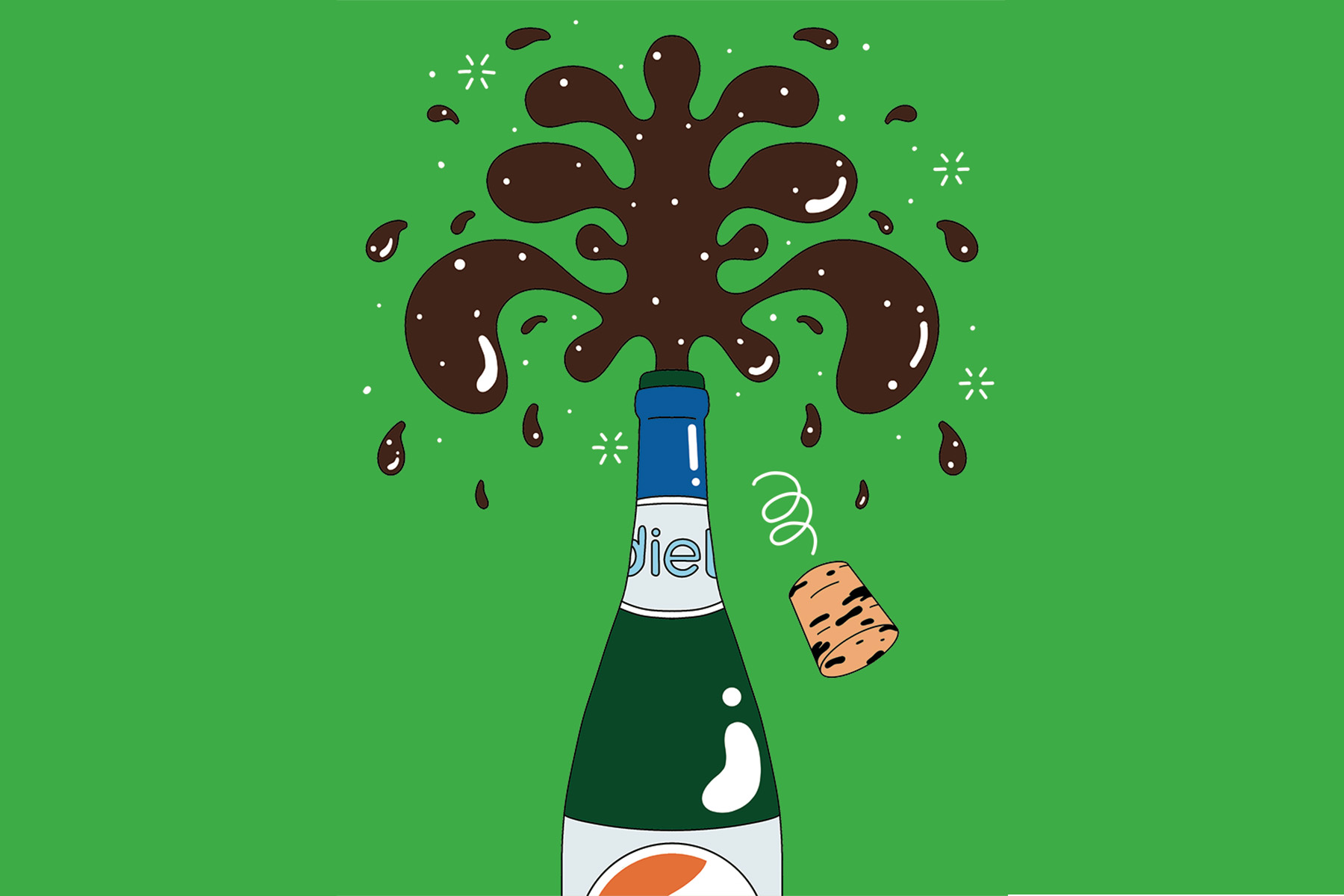My Guilty Pleasure Is My Old Friend, Diet Pepsi
Length: • 3 mins
Annotated by Mark Isero

I’ll begin by stating that this is not so much an essay about Diet Pepsi as it is about wine. I came out of the COVID-19 years drinking a glass of wine a day, two if I was writing, in addition to my usual weekend consumption of plentiful wine over dinner with friends. Nearly everyone in my world here in Montreal, where people are sharp and thinky and food obsessed and nobody wants to be a party pooper, told me that my kind of drinking was no problem. Still, it bothered me. Because wine felt like a new anvil of wanting sitting in the middle of my life, another layer to manage in an internal world already painfully overabundant with desire.
I was not going to become teetotal. But I needed a replacement strategy for my at-home wine—mainly, the wine that accompanied the writing, which I saw as my slipperiest slope. So I went to the supermarket to find the most explosively fun drink I could drink instead. I scanned past all the irritatingly good-for-you millennial soft drinks, all those seltzers with a spritz of pomegranate, and Italian-ish things that are some variation on Orangina, and landed in the very bad, corn syrupy place: the root beer, the Coke, the Sprite, the Pepsi. And then I saw the other bad place—the Diet Coke, the diet ginger ale, the Diet Pepsi, all the aspartame and papery, chemical tastes and weird, counterproductive diet culture. And I was like: Yeah. I’m gonna be this kind of bad—twentieth-century diet-cola bad.
- Mona Awad’s Skin Care Obsession
- Why I Can’t Stop Watching Say Yes to the Dress
- The Legend of Zelda’s Wild Landscapes Fill Me with Awe
Diet sodas have been plummeting in popularity over the past number of years, their market share eaten into by everything from coffee to water. Diet cola’s current, most well-known lovers are a progressive’s nightmare of Bad White Men—Elon Musk famously photographed his bedside table laden with guns and cans of Diet Coke; while in office, Donald Trump was known to drink twelve cans a day. Score a billion for the reputation of coconut water, then.
Anyway, myself, I hadn’t drunk diet cola in a while. When I was in high school and college, in the 1980s and ’90s, I drank it all the time. Why it was Diet Pepsi rather than the more popular Diet Coke is a mystery, possibly answered by Quebec’s long-standing affinity for Pepsi over other colas. Back then, my Diet Pepsi drinking was part of a routine of borderline-anorexic self-perfectionism that also included chains of Marlboro Lights (which we club kids would buy from the reservations) and sugar-free gum, plus very tight dresses and eccentric forms of teenaged calorie restriction that still managed to include poutine at 2 a.m. Diet Pepsi was not a place of health for me but rather of decadent control.
And I needed some control here? I guess? Whatever the reason, back it came. The first can I drank was both exhilarating—it tasted like seventeen!—and bewildering. I am currently writing a cookbook with a big-time restaurant here in Montreal. I’ve been more attuned to taste. And frankly, I couldn’t figure out what this stuff tasted like. I brought a bottle to the restaurant’s sommeliers, and one decanted some into a wine glass, sipped, and shook his head, flummoxed. The final unhelpful consensus was that it tasted like faux sweetness and maximum carbonation.
In other words, Diet Pepsi tastes like a process. And I was in a process. When the silver-bullet cans landed in my kitchen, next to the Greek yogurt and organic eggs and Moroccan olives, my teenaged daughter looked at me like I had placed a large bag of cocaine in the fridge. My younger, who is eight and a fan of the junkiest foods on earth, was dancing with excitement, because this was not some bubbly pleasure-ruse that smelled like blood orange; here were real soft drinks.
And while I don’t want to end with a bow about how I stymied a booze issue with Diet Pepsi, the drinks did truly wean me off over-regularized wine. I don’t even need to drink Diet Pepsi when I am writing anymore. But I do have a can by my side now. Because I love Diet Pepsi. Like an old friend. And if that friend’s a bit toxic? Well, maybe life’s just a little more exciting for it.
Mireille Silcoff is an award-winning author and a regular contributor to The New York Times Magazine. She lives in Montreal.
Melanie Lambrick is an illustrator based on a remote island in British Columbia. She has worked with an international roster of clients, including the New York Times, The Atlantic, the Washington Post, and Volkswagen.